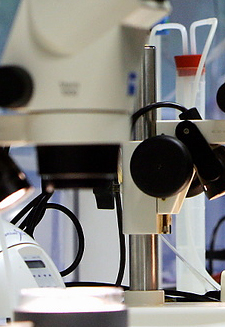Forschungsgebiete
Key interests
Current challenges that we are tackling focus on the molecular innate immune system and include:
- Characterisation of how complement opsonisation is regulated and what communicative signals complement opsonins send out to bystander cells
- Development and testing of novel biopharmaceutical complement inhibitors
- Characterisation of inflammatory complement activation on bio- and nanomaterials
- Investigation of complement's influence on shaping an inflammatory or a tolerogenic immune response
- Characterisation of the interactions between complement proteins with the malaria parasite Plasmodium falciparum
Main methods
We specialise in characterising protein-protein, protein-ligand and protein-cell interactions and furthermore engineer, produce and test novel immunmodulatory biopharmaceutical candidates. To achieve this we use a wide range of protein biochemical and immunological techniques ranging from recombinant protein technology (protein expression in bacterial, yeast and mammalian hosts followed by protein purification), knowledge-based protein engineering, protein chemistry, biophysical interaction analysis (e.g. SPR), fluorescent cell microscopy, fluorescence-activated cell sorting (FACS), protein and cell-based immunological assays (e.g. invovling patient-derived cells) and in collaboration structural biology techniques to obtain high resolution structures of porteins and protein complexes.
Research interests of the former group of Biochemical Pharmacy:
Development of Compounds for the Lipid-based Nucleic Acid Transfer (Lipofection):
In the last decade the definition of drugs has changed. In this context the term "gene therapeutics " was created. Gene therapeutics are drugs with nucleic acids as effective component. Besides the development of therapeutic nucleic acids one main focus of research is the development of effective carriersystems to overcome biological barriers. These carriers are needed to transport the nucleic acid to the target site.
In our research group we develope new aminofunctionalized lipids as DNA carriers. In our labs we carry out the biological and physical-chemical characterization of the lipid formulations and their complexes with DNA. Current work focuses on the development of lipoplex formulations for application in-vivo.
The work has been awarded with the "Wissenschaftspreis der Bayer Bitterfeld GmbH" (Dr. Christian Wölk 2015) and the "Wissenschaftstransferpreis der Uni Halle" (Dr. Christopher Janich 2017)
Cooperation Partners:
Prof. Dr. Gerald Brezesinski (MPI of Colloids and Surfaces, Potsdam) [mehr]
Prof. Dr. Udo Bakowsky (Philipps University Marburg) [mehr]
Prof. Dr. Thomas Groth (Institute of Pharmacy, AG Biomedizinische Materialen, MLU Halle/Wittenberg) [mehr]
Development of MDR-Modulators:
Investigation of Biotransformation and Toxicity of Drugs in Keratocytes
Synthesis of Deuterated Ceramides


